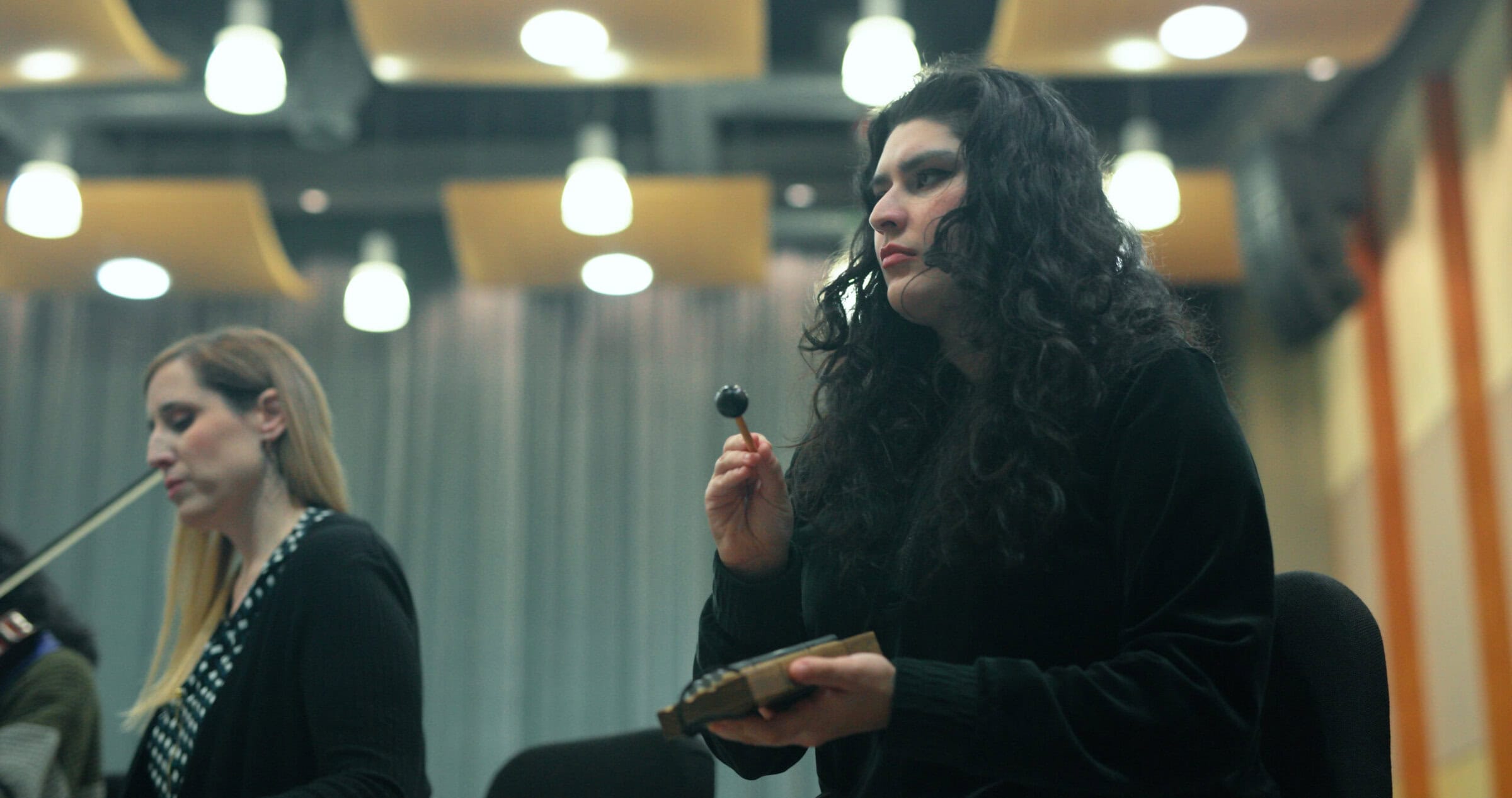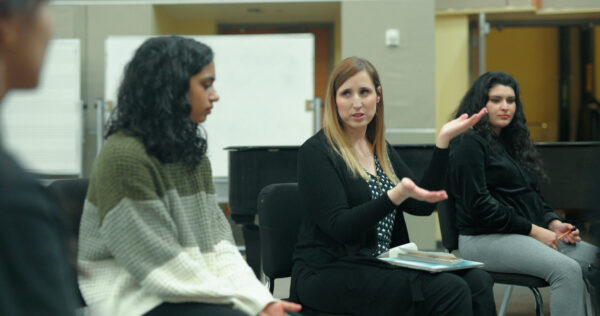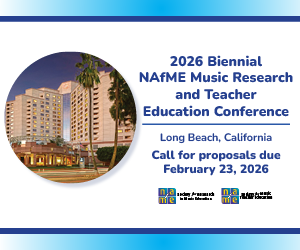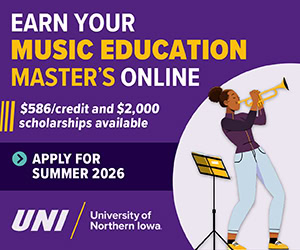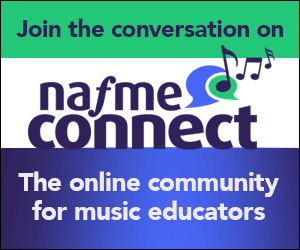/ News Posts / Faculty-Alumni Projects That Empower Students
Faculty-Alumni Projects That Empower Students
By NAfME Members Dr. José Valentino Ruiz and Derris Lee
As music educators and academic leaders, one of our most powerful tools for advancing student development is experiential learning—especially when it emerges through real-world creative production. In this article, we propose a replicable model for faculty: a research-driven, performance-based project that connects current students with alumni professionals through mentorship and co-creation. This approach can be implemented any time during the academic year, yielding meaningful results across artistic, pedagogical, and professional domains.
Why This Model Matters
While traditional coursework builds foundational knowledge, students often experience their most impactful growth in project-based environments. Faculty-guided initiatives—such as album production, collaborative compositions, multimedia portfolios, or public performances—allow students to engage deeply with the creative process from conception to dissemination. Bringing alumni into these projects as collaborators or producers expands the learning environment, cultivates intergenerational mentorship, and provides real-world relevance while showcasing the continued legacy of the institution’s graduates.
Case in Point: A Proposed Collaboration
One such model under consideration at our institution involves a faculty-led album that incorporates original works and culturally responsive reinterpretations of existing repertoire. The process includes professional MIDI arrangement, live instrumentation by students and faculty, and alumni participation in key roles such as producing, engineering, and scheduling. These collaborations are not just about artistic output—they also support faculty research, student portfolio development, and alumni employment through appropriate compensation mechanisms, such as institutional research funds or grants.
Why Employing Alumni Works
Collaborating with alumni adds tremendous value to institutional initiatives. Alumni bring current industry experience, technological fluency, and cultural relevance—all while holding a unique connection to the values and standards of their alma mater. Their involvement bridges academic theory with applied practice and strengthens the identity of music programs as dynamic, lifelong communities. Employing alumni as co-producers or project leads also frees faculty to focus on supervision and quality assurance while ensuring students are supported by role models who understand both the student experience and the demands of the industry.
Real-World Examples: Bridging Theory and Practice
Two recent projects exemplify this model in action. The first, From the Studio to Society: Empowering Music Students as Cultural Entrepreneurs, published in the Media Journal of Creative Economy and Industry-Based Education, explores how students transformed classroom learning into culturally impactful media through real-world album production and collaborative storytelling. The documentary-styled feature highlights the pedagogical frameworks and creative strategies that guided the project’s success.
A companion media article, What’s It Like to Be a Champion?, documents how an educationally driven children’s album won a Latin GRAMMY® through global collaboration and scalable production models rooted in higher education values. This initiative demonstrated that industry-level outcomes are possible when students, faculty, and alumni co-create with intention and integrity.
These examples serve not as exceptions but as replicable models—evidence that public scholarship, commercial creativity, and mentorship can thrive in unison when structured with care.
Outcomes and Deliverables (when implemented)
- Professionally released creative products (albums, media, performances)
- Podcast episodes, panel discussions, or public talks contextualizing the work
- Student-authored articles, blogs, or reflections on the creative process
- Submission of works to competitions and professional showcases
- Research documentation aligned with faculty publication or grant goals
Implementing This Model in Your Program
This model is adaptable to many formats and timelines. Begin by identifying alumni whose expertise and availability align with your project vision. Then structure the collaboration around a well-defined scope, clear deliverables, and meaningful student roles. Consider how funding—through research, innovation, or DEI initiatives—can support alumni involvement. The key is to design projects that allow for reciprocal learning between students, alumni, and faculty, ensuring every contributor benefits artistically, professionally, and educationally.
Final Reflection
Faculty-alumni collaborations represent more than nostalgic outreach—they’re strategic investments in a music program’s ecosystem. They honor legacy, foster community, and model the entrepreneurial mindset we hope to instill in our students. Whether through studio recordings, interdisciplinary installations, or educational media, these projects prove that when we activate the strengths of our alumni, we don’t just enrich student learning—we multiply our impact as educators.
References
Ruiz, J.V., Acevedo, R., Bourne, T., Shelton, C., Lee, D., Ciulei, S., Nieves, E. (June 1, 2025). What’s It Like to Be a Champion? Creating a Latin Grammy-Winning Children’s Album Through Educational Innovation and Global Collaboration. Media Journal of Creative Economy and Industry-Based Education.
Ruiz, J.V., Castillo, J., Lee, D., Acevedo, R., Shelton, C., Downing, S. (June 3, 2025). From the Studio to Society: Empowering Music Students as Cultural Entrepreneurs. Media Journal of Creative Economy and Industry-Based Education.
About the authors:
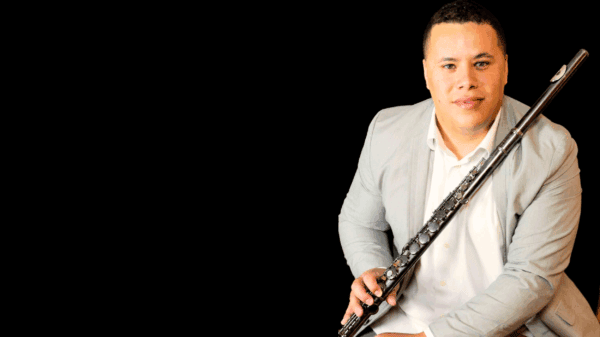 NAfME member José Valentino Ruiz, Ph.D. is an EMMY® and multi–GRAMMY® Award-winning producer, educator, and entrepreneur. He serves as Associate Professor and Program Coordinator of Music Business & Entrepreneurship at the University of Florida and is a U.S. Cultural Diplomat with the U.S. Department of State. For more information, visit: www.josevalentino.com.
NAfME member José Valentino Ruiz, Ph.D. is an EMMY® and multi–GRAMMY® Award-winning producer, educator, and entrepreneur. He serves as Associate Professor and Program Coordinator of Music Business & Entrepreneurship at the University of Florida and is a U.S. Cultural Diplomat with the U.S. Department of State. For more information, visit: www.josevalentino.com.
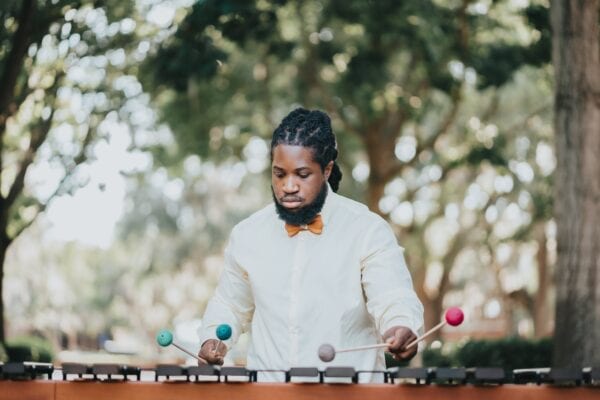 NAfME member Derris Lee, M.M. is a Global Genius® Music Award Winning and UK Bach International Music Competition’s Absolute First Prize® Winning percussionist, producer, and music educator whose work spans performance, engineering, and arts entrepreneurship. He is the Delores Auzenne Fellow at the University of South Florida Center for Music Education Research and collaborates on creative projects that bridge academia and the music industry. For more information, visit: www.derrislee.com.
NAfME member Derris Lee, M.M. is a Global Genius® Music Award Winning and UK Bach International Music Competition’s Absolute First Prize® Winning percussionist, producer, and music educator whose work spans performance, engineering, and arts entrepreneurship. He is the Delores Auzenne Fellow at the University of South Florida Center for Music Education Research and collaborates on creative projects that bridge academia and the music industry. For more information, visit: www.derrislee.com.
Interested in reprinting this article? Please review the reprint guidelines.
The National Association for Music Education (NAfME) provides a number of forums for the sharing of information and opinion, including blogs and postings on our website, articles and columns in our magazines and journals, and postings to our Amplify member portal. Unless specifically noted, the views expressed in these media do not necessarily represent the policy or views of the Association, its officers, or its employees.
Published Date
July 22, 2025
Category
- Careers
- Collegiate
- Diversity, Equity, Inclusion, and Access (DEIA)
- Innovation
- Lifelong Learning
- Preparation
- Research in Music Education
Copyright
July 22, 2025. © National Association for Music Education (NAfME.org)
